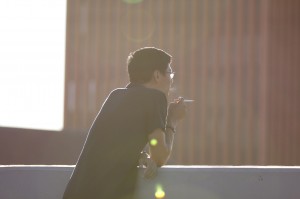USC scientists receive grant to study effects of smoking
USC scientists in the Keck School of Medicine Department of Preventative Medicine were one of 14 groups that received funding to research smoking in vulnerable populations, according to the Keck School of Medicine.

Light ’em up · A USC student takes a break to smoke a cigarette across from Waite Phillips Hall on campus. USC researchers received a grant from the Food and Drug Administration to research the effects of smoking. tobacco. – Photo Illustration by Nick Entin
The $20 million grant was given to allow the USC researchers to participate in a first-of-its-kind regulatory science tobacco program that will use the grant over five years to establish one of 14 Tobacco Centers of Regulatory Science. The funding is provided by the Food and Drug Administration and through the National Institutes of Health.
The leading investigators on the project for USC are Dr. Jonathan Samet, professor and chair of preventive medicine, and Mary Ann Pentz, professor of preventive medicine and director of the Institute for Prevention Research at the Keck School of Medicine.
“There are certain things that the FDA needs to deal with under the laws, and they need the scientific basis for doing that,” Samet said. “What we do and what others do might be the basis for regulations. It might be the basis for public health campaigns. It might be the basis for thinking about how to control advertising on the Internet related to tobacco use.”
The program will research seven different aspects of smoking, from the marketing of tobacco products to the reduction of toxicity and carcinogenicity.
“The grant involves not only the School of Medicine, but other schools: [the] Pharmacy [School], Annenberg [School of Communication and Journalism], Dornsife [School of Arts, Letters and Sciences]. Other schools are involved,” Samet said. “It’s a big center and we want to reach across the campus and that was one of our strengths, to really draw on all the aspects of USC.”
Other institutions awarded TCORS grants include the American Heart Association, University of Maryland, Virginia Commonwealth University, Georgia State University, UC San Francisco, University of Vermont, University of Pennsylvania, Yale University, Penn State University, University of Texas, The Ohio State University and University of North Carolina at Chapel Hill, according to the press release.
“Our team put together a large application and it goes through the scientific review process and the agencies,” Samet said. “The FDA and NIH look at it carefully to decide if we were doing things relative to their mission, and were we going to do good science, and if we had done good science in the past.”
With evidence against tobacco use becoming increasingly common, students also questioned whether or not smoking should be allowed on campus.
“I think [smoking] should be allowed. I don’t smoke personally, but it is a freedom that I think people should be able to have,” said Tim Cheung, a second-year master’s in business administration student. “I think relatively, smoking isn’t that bad in outdoor situations because particularly in L.A., there is already so much pollution.”
Some students said they do not notice a major smoking presence on USC’s campus.
“Honestly, I don’t mind because I don’t really see it,” said Brendan Plecque, a senior majoring in aerospace engineering. “If there were people smoking all over the place I would probably get kind of annoyed because I am not a very big fan of tobacco in general.”
Samet, however, said any amount of smoking is a public heath issue.
“There is already enough evidence on enough campus to see that USC ought to be able to do it. I think we and the other centers will continue to contribute,” Samet said. “The evidence on secondhand smoke, the literate issues, keeping the idea of health and that USC promotes health is really enough basis that our campus should go smoke-free. Many campuses, including urban campuses, have gone smoke-free and I hope we go in that direction.”
Samet also pointed out that people ages 18 to 26, which includes many USC students, are especially vulnerable to becoming smokers.
“We will be looking at things like what happens at points of sale, what happens over the Internet and how social media is used to create the image of tobacco and bring those images to use,” Samet said.
Follow Alana on Twitter @alanavictor5

I can’t believe its taken the FDA this long to fund this kind of research. Glad to know we’re finally headed in the right direction.
Seriously? Wow, about time somebody studies the effects of smoking…seriously???